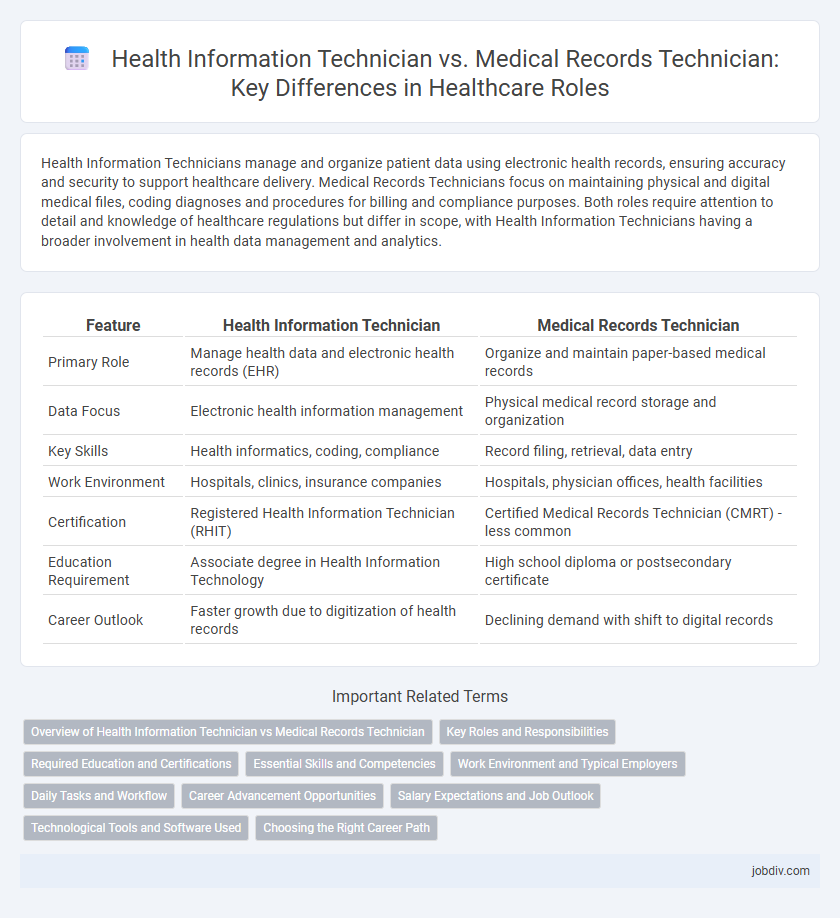Health Information Technicians manage and organize patient data using electronic health records, ensuring accuracy and security to support healthcare delivery. Medical Records Technicians focus on maintaining physical and digital medical files, coding diagnoses and procedures for billing and compliance purposes. Both roles require attention to detail and knowledge of healthcare regulations but differ in scope, with Health Information Technicians having a broader involvement in health data management and analytics.
Table of Comparison
| Feature | Health Information Technician | Medical Records Technician |
|---|---|---|
| Primary Role | Manage health data and electronic health records (EHR) | Organize and maintain paper-based medical records |
| Data Focus | Electronic health information management | Physical medical record storage and organization |
| Key Skills | Health informatics, coding, compliance | Record filing, retrieval, data entry |
| Work Environment | Hospitals, clinics, insurance companies | Hospitals, physician offices, health facilities |
| Certification | Registered Health Information Technician (RHIT) | Certified Medical Records Technician (CMRT) - less common |
| Education Requirement | Associate degree in Health Information Technology | High school diploma or postsecondary certificate |
| Career Outlook | Faster growth due to digitization of health records | Declining demand with shift to digital records |
Overview of Health Information Technician vs Medical Records Technician
Health Information Technicians manage, analyze, and secure digital health data using advanced electronic health record (EHR) systems to ensure accurate patient information and compliance with healthcare regulations. Medical Records Technicians primarily focus on organizing, maintaining, and retrieving physical and electronic medical records, ensuring data accuracy and confidentiality. Both roles support healthcare providers but differ in technological integration and scope of responsibilities within health information management.
Key Roles and Responsibilities
Health Information Technicians manage patient data accuracy, coding, and security within healthcare systems, ensuring compliance with legal standards and facilitating efficient information flow. Medical Records Technicians focus on organizing, updating, and maintaining patient records, supporting healthcare providers with accessible and accurate documentation for treatment and billing. Both roles require expertise in electronic health record (EHR) systems and strong attention to detail for managing sensitive health information.
Required Education and Certifications
Health Information Technicians typically require an associate degree in health information technology or a related field and may obtain the Registered Health Information Technician (RHIT) certification offered by the American Health Information Management Association (AHIMA). Medical Records Technicians often need a postsecondary certificate or an associate degree in health information technology, with certification options such as the Certified Coding Specialist (CCS) or Certified Medical Reimbursement Specialist (CMRS) enhancing employment prospects. Both roles emphasize knowledge of electronic health records (EHR) systems, medical terminology, and healthcare data management, with certification serving as a significant factor in job advancement and credibility.
Essential Skills and Competencies
Health Information Technicians and Medical Records Technicians both require strong skills in data management, attention to detail, and proficiency with electronic health record (EHR) systems. Health Information Technicians often need advanced analytical abilities and knowledge of health informatics standards, while Medical Records Technicians focus more on accurate codification, data entry, and maintaining patient confidentiality. Competency in regulatory compliance, medical terminology, and communication skills is essential for both roles to ensure precise and secure handling of health information.
Work Environment and Typical Employers
Health Information Technicians and Medical Records Technicians typically work in hospitals, outpatient care centers, and physician offices where maintaining accurate patient records is essential. Medical Records Technicians often find employment in long-term care facilities and nursing homes, focusing on organizing patient charts and billing information. Both roles require proficiency with electronic health records (EHR) systems and thrive in environments that prioritize confidentiality, accuracy, and compliance with healthcare regulations such as HIPAA.
Daily Tasks and Workflow
Health Information Technicians manage electronic health records by organizing, analyzing, and maintaining patient data to ensure accuracy and compliance with regulatory standards. Medical Records Technicians primarily focus on retrieving, coding, and filing medical documents, facilitating efficient access to patient information for clinical teams. Both roles require proficiency in health information systems, but Health Information Technicians typically engage more with data analysis and quality control processes.
Career Advancement Opportunities
Health Information Technicians typically have greater career advancement opportunities than Medical Records Technicians due to their broader skill set in managing electronic health records and health data analytics. They can progress into roles such as Health Information Managers, Data Analysts, or Compliance Officers, leveraging expertise in health informatics and regulatory standards. Medical Records Technicians often have more limited upward mobility, primarily advancing within clerical or administrative specialties focused on patient record maintenance.
Salary Expectations and Job Outlook
Health Information Technicians earn a median annual salary of approximately $45,240, while Medical Records Technicians typically make around $44,090, according to the U.S. Bureau of Labor Statistics. The job outlook for Health Information Technicians is projected to grow 9% from 2022 to 2032, reflecting increasing demand for digital health data management. Medical Records Technicians have a slower growth rate of about 6%, highlighting a steady but less rapid expansion in traditional medical record roles.
Technological Tools and Software Used
Health Information Technicians and Medical Records Technicians both utilize electronic health record (EHR) systems like Epic and Cerner to manage patient data efficiently. Health Information Technicians often work with advanced data analytics software and coding tools such as ICD-10 and CPT to optimize healthcare documentation and billing accuracy. Medical Records Technicians primarily focus on maintaining physical and digital records, frequently using document management systems and medical transcription software to ensure precise and accessible patient information.
Choosing the Right Career Path
Health Information Technicians and Medical Records Technicians both manage patient data, but Health Information Technicians typically handle electronic health records and data analytics, requiring knowledge of healthcare informatics and coding systems. Medical Records Technicians primarily focus on organizing and maintaining paper and digital medical records, emphasizing accuracy and confidentiality. Choosing the right career path depends on your interest in technology integration versus traditional record-keeping within healthcare settings.
Health Information Technician vs Medical Records Technician Infographic

 jobdiv.com
jobdiv.com